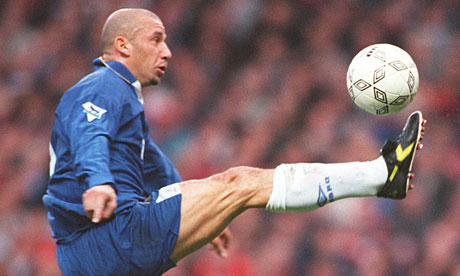
There was a time when a team that lost a player could usually expect some sympathy. "Come on the 10 men" was the cry after somebody had been forced off with an injury or struggled on as a passenger, often aggravating the problem in the process.
The introduction of substitutes all but ended the risk of a side being handicapped in this way. Now a team can be reduced in numbers through injuries only if they have already cleared their bench when a stricken player has to leave the field. Red cards are almost wholly responsible for thinning out the ranks.
The dismissal of a player does not necessarily spoil a match. It would have been hard to find a Manchester City fan leaving Old Trafford on Sunday feeling short-changed because Manchester United's Jonny Evans had been sent off when their opponents were leading 1-0. City's 6-1 win is already part of football history. The fact that for half the game they were playing against 10 men will never be anything more than a footnote.
Yet when one side lose a man the symmetry of the play is bound to be affected and sometimes this can make things as difficult for the opponent as the team that have been depleted. If there is an art to playing with 10 men or fewer then there is also a knack of exploiting the advantage with a full complement of players.
For a start a team that have gone a man down will immediately draw men back in an attempt to minimise the disadvantage. With one player left upfield as a token attacker their opponents will usually be left facing an eight-man defence, which is harder to break down. The weakened side will be less inclined to attack in numbers and the team at full strength will often become frustrated when their passes are intercepted and they are cramped for space as they seek to find a way through.
The textbook way of overcoming the problem is to keep possession and use the full width of the pitch to stretch the opposition's cover to a point where they begin to feel the need of the extra man. But this demands a combination of technique and patience that not every team has.
Last weekend's encounter between Queens Park Rangers and Chelsea at Loftus Road was a case in point. Having fallen behind to Heidar Helguson's early penalty Chelsea found themselves reduced to nine players by half-time following the dismissals of José Bosingwa and Didier Drogba. Yet QPR still won by only a single goal and amid all the subsequent hullabaloo, which had the losing manager, André Villas‑Boas, going off at the deep end about the refereeing of Chris Foy while the repercussions of what may or may not have been said by his captain, John Terry, continue, the fact that Chelsea had coped rather well for the remainder of the game has been largely overlooked.
It was as much a masterclass in how to play with nine against 11 as Leeds United had achieved at Stamford Bridge in December 1997, when they too were down to nine players for half the game but still managed to hold Chelsea to a scoreless draw. Had Paddy Kenny, the QPR goalkepeer, not blocked Nicolas Anelka's header late in the match Chelsea might have taken a point their organisation, if not their earlier lack of discipline, deserved.
It would appear, then, that taking on QPR with nine players was an easier proposition than facing Manchester City with 10. Of course the difference was that Rangers, in the words of David Pleat, "did not help themselves by making poor passing selections and getting caught in possession instead of working the ball calmly and making Chelsea chase from flank to flank". City had the technique and judgment fully to exploit their superior numbers. They also had David Silva.
Had Darren Fletcher's goal not prompted thoughts of a late comeback at 3-1 Manchester United might not have gone gung-ho and conceded another three. Something of the defensive discipline Ron Atkinson's United team showed in the 1985 FA Cup final against Everton, won by Norman Whiteside's goal in extra time after Kevin Moran had been sent off, would not have come amiss.
On Sunday Manchester City ended up attacking two defenders and a goalkeeper. "Suicidal, crazy," was how Sir Alex Ferguson described it. Fun to watch, though.

